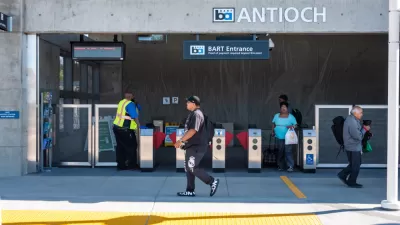The SF Municipal Transportation Agency's Central Subway project, opposed by transit advocacy group SaveMuni, received a Full Funding Grant Agreement from FTA that dedicates $942.2 million to the Caltrain to Chinatown extension of the 'T' LRT line.
Muni's newest light rail line, the T Third St. began service in 2007. Phase I runs from southeast SF along the Bayshore Corridor to the Caltrain (commuter rail) Depot (where it joins existing tracks to go downtown. See current route). Phase II will run from the Caltrain Station for several blocks and then enter a "new Central Subway" to cross under Market St. and continue to Chinatown. The $1.6 billion Phase II now appears to be fully funded, though legal obstacles remain. Opening date is set at 2019, the same year that electrification of the Caltrain line is expected to be completed.
"U.S. Secretary of Transportation Ray LaHood, Democratic Leader Nancy Pelosi, U.S. Senator Dianne Feinstein, Congresswoman Jackie Speier, Federal Transit Administration (FTA) Administrator Peter Rogoff, Board of Supervisors President David Chiu and other federal, state and local officials joined San Francisco Mayor Edwin Lee at a ceremony at the future site of the Central Subway's Union Square/Market Street Station to announce the approval of the New Starts funds.
The Central Subway's Full Funding Grant Agreement (FFGA) was approved by FTA Administrator Peter Rogoff on October 11."
According to the Federal Transit Administration, "the full funding grant agreement (FFGA) is the final step of the New Starts planning and project development process."
Michael Cabanatuan, transportation reporter for the San Francisco Chronicle, writes that a "lawsuit, filed by subway critics Save Muni, is the latest, and so far most aggressive, effort to stall or kill construction of the 1.7-mile subway from Caltrain to Chinatown. The suit contends that the Municipal Transportation Agency's plans to build an entrance to the Union Square/Market Street station in the square violated a City Charter prohibition of nonrecreational uses in city parks."
The transit advocacy group prefers bus-based surface and 'shallow subway' alternatives to improve one of the most heavily used transit routes along Stockton St. into Chinatown. Electric trolley buses currently service this corridor.
FULL STORY: SFMTA receives $942.2 million in federal funding for Central Subway Project

Planetizen Federal Action Tracker
A weekly monitor of how Trump’s orders and actions are impacting planners and planning in America.

Chicago’s Ghost Rails
Just beneath the surface of the modern city lie the remnants of its expansive early 20th-century streetcar system.

San Antonio and Austin are Fusing Into one Massive Megaregion
The region spanning the two central Texas cities is growing fast, posing challenges for local infrastructure and water supplies.

Since Zion's Shuttles Went Electric “The Smog is Gone”
Visitors to Zion National Park can enjoy the canyon via the nation’s first fully electric park shuttle system.

Trump Distributing DOT Safety Funds at 1/10 Rate of Biden
Funds for Safe Streets and other transportation safety and equity programs are being held up by administrative reviews and conflicts with the Trump administration’s priorities.

German Cities Subsidize Taxis for Women Amid Wave of Violence
Free or low-cost taxi rides can help women navigate cities more safely, but critics say the programs don't address the root causes of violence against women.
Urban Design for Planners 1: Software Tools
This six-course series explores essential urban design concepts using open source software and equips planners with the tools they need to participate fully in the urban design process.
Planning for Universal Design
Learn the tools for implementing Universal Design in planning regulations.
planning NEXT
Appalachian Highlands Housing Partners
Mpact (founded as Rail~Volution)
City of Camden Redevelopment Agency
City of Astoria
City of Portland
City of Laramie




























